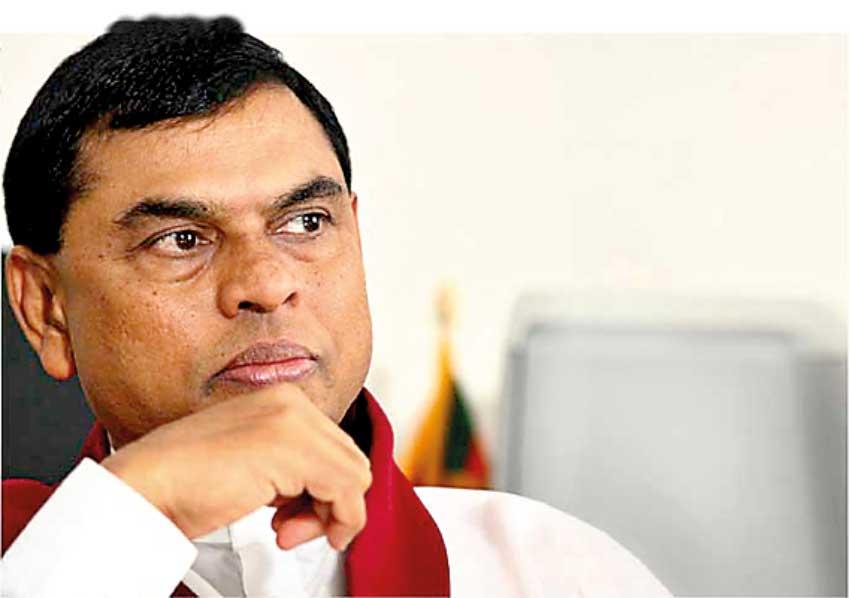18 Jun 2022 - {{hitsCtrl.values.hits}}

 The remark by former Finance Minister and the National Organiser of the Sri Lanka Podujana Peramuna (SLPP) at his farewell press briefing that those who voted for President Gotabaya Rajapaksa and the present government was also responsible for the current political and economic crisis gives much interesting food for thought.
The remark by former Finance Minister and the National Organiser of the Sri Lanka Podujana Peramuna (SLPP) at his farewell press briefing that those who voted for President Gotabaya Rajapaksa and the present government was also responsible for the current political and economic crisis gives much interesting food for thought.
Despite the fact that his speech after the resignation as a Parliamentarian and his answers to journalists at the briefing on June 10 was seen as an occasion for lack of empathy towards the people of this country who are facing an economic calamity, the very environment of the briefing was something that warrants serious consideration.
Instead of turning the occasion into a serious discussion on the current economic disaster and the way forward, he turned it into a lighter moment cracking jokes.
When journalists pressed him to take his share of the responsibility to the current predicament of the country as the former Economic Development Minister who singlehandedly ran the economy for nearly five years between 2010 and 2015 as well as for the past three years – two years from behind the scenes and nearly one year as the Finance Minister – he refused to budge. Instead he squarely placed the responsibility on the media and the people who voted for the President and the SLPP government.
His blame on the people in a way cannot be deemed as an insult to the voters, as suggested by many, since he was talking sense about the people and the media. However, it is indisputably a betrayal of 6.9 million people who reposed trust on him and his party. It was he and his party that created an environment for the masses to vote for them. It was nothing but somebody who hoodwinked the masses blaming them for being hoodwinked. That is where it warrants to be described as an insult to the voters. Hence, despite the merit of his statement, he loses the moral right to blame the voters, as he knew how his party hoodwinked the people with blown up images of his party’s candidates as well as a campaign drenched with highly sensationalized communalism.
Should the media and the people take the blame for the current situation as Basil insisted? Yes, indeed, but they are not the first accused, a place undoubtedly reserved for politicians. It is the politicians who create a situation during elections for the voters to vote for them after a bitter competition with their rivals. The Statement by Basil Rajapaksa acquires its merit by the folly and the gullibility on the part of the people who are not prudent enough and not being sufficiently and properly informed to take the correct decisions at elections. Thus, voters who elected Gotabaya Rajapaksa and the SLPP government definitely share a considerable part of responsibility for the current economic and political impasse and for the resultant every nightmarish incident that people go through individually. Yes, Basil is correct, despite him wanting to evade the responsibility and put it entirely on the people.
In another sense, he must be commended for his forthrightness in telling a truth that no other politician dares to do. It is an eye opener and a warning for the people to be conscious when they use their precious vote to elect their leaders – from the President to the members of local government body.
Several factors contribute in shaping the mind of the voter to vote for a particular political party or an independent group at an election, apart from his or her traditional attachment to that party. Mainly among them are the outshining of promises of other parties by those of his party, his party’s ability to exploit the racial, caste and religious sensibilities of the people, especially the majority community in the area concerned and the apparent probability of victory of that party. These factors are ensured to him by the media.
There have been rare occasions such as the 2015 Presidential election where undercurrents have outsmarted these factors. Mahinda Rajapaksa had given attractive promises about economic prosperity against Maithripala Sirisena’s less attractive promises on democracy including abolition of the Executive Presidency. Rajapaksa exploited to the core a racist campaign against Muslims that had already been carried out by the Bodu Bala Sena and the Jathika Hela Urumaya (JHU) since 2012. The campaign had instilled fears of a Muslims invasion of the country by way of gaining cultural and populational superiority, among a section of Sinhalese Buddhists. Sirisena, on the other hand, joined hands with the Muslim political parties, risking losing a considerable segment of votes of the majority community. Sirisena’s campaign was no match for that of his rival which in its appearance had ensured Rajapaksa’s victory. Nevertheless, the undercurrent eventually had its day for Sirisena.
People have been succumbing to racist campaigns in their respective areas during past elections. It has been the ability to lash out the Sinhala-Buddhist leaders most that decided the outcome of most elections in the North and the East while the same against Sinhalese Buddhists and the Tamils determined the successes of the Muslim leaders. Interestingly, many of them later, joined hands with the very Sinhalese leaders they demonized during the election. Before the end of the war in 2009, the Sinhalese leaders used to identify their rivals with the Liberation Tigers of Tamil Eelam (LTTE), sometimes on ludicrous grounds. Sometimes both main parties amusingly used this bogey against each other during the same election. Eventually, voters forgot their burning problems that have to be solved by the politicians and hate decided the outcome of the vote.
Despite the veracity of the allegation that the SLPP was behind the terrorist attack on Christians on the Easter Sunday of 2019, it is undisputable that the party unashamedly used the carnage to the core to win the 2019 Presidential election and the 2020 Parliamentary election. Six days after the brutal attack on Christians on April 21, 2019, Gotabaya Rajapaksa, the Defence Secretary during the successful segment of the war against the LTTE announced his intention to contest the forthcoming Presidential election, giving assurances of safety and security of the people. The pro-SLPP media outlets had demonized the Muslims and their religion, Islam in such a manner that the country had come to the brink of a countrywide bloodshed against Muslims similar to the 1983 pogrom against Tamils. It had been the habit of politicians and the media to find new evidence to prove their theory of Muslim cultural and populational superiority. The Muslims too gave them ample ammunition by their religious exhibitionism.
On the other hand, the war against the LTTE was used to boost Presidential candidate Gotabaya Rajapaksa despite him displaying his immaturity during media conferences. The large scale corruption, the role played by Rajapaksas including Basil and the highhanded activities that mainly contributed to Rajapaksa regime’s ouster in 2015 was overshadowed and forgotten by the people, with the unashamed racism and artificially boosted image of Gotabaya. People now scornfully repost the video footages that likened him to Lee Kuan Yew, the iconic former Prime Minister of Singapore.
People let this propaganda and racism to overwhelm them without using their intelligence. On the other hand, they were not properly informed by a prudent and in-depth discourse on their problems and the policies of political parties by the media. Finally, they paved the way for the leaders whom they voted for to say “it was you and not us who are responsible for the current mayhem.”
27 Nov 2024 9 minute ago
27 Nov 2024 19 minute ago
27 Nov 2024 23 minute ago
27 Nov 2024 41 minute ago
27 Nov 2024 2 hours ago